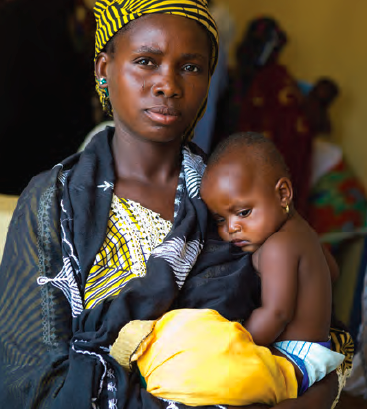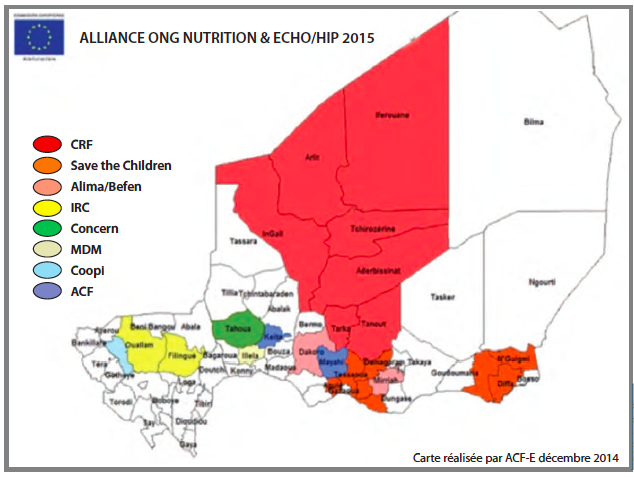Niger Nutrition Alliance
 Maïté Bagard has been the Niger Nutrition Alliance Coordinatorsince January 2015.
Maïté Bagard has been the Niger Nutrition Alliance Coordinatorsince January 2015.
Background
In Niger, acute malnutrition (wasting) in children is still a major public health issue. In 2014, a national nutritional survey reported a prevalence of acute malnutrition of 18%, of which 2.7% was severe acute malnutrition (SAM) in six out of the eight geographical regions of Niger. Many agencies have been supporting activities to address undernutrition in Niger. This article describes the work of the Niger Nutrition Alliance.
The Alliance, formed in 2013 with funding from European Commission DG ECHO, is a network of non-governmental organisations1 acting to prevent and manage SAM in Niger. It provides a platform for communication, partnership, advocacy and sharing of best practice, and members are supported to adopt a common discourse and harmonise their approaches.
From 2013 to 2015, the Alliance has strengthened engagement among partners through meetings, document exchange, presentations and advocacy events. Alliance partners have increased cooperation with other actors involved in nutrition, particularly the Government initiative I3N, Nigeriens feed Nigeriens2, the National Technical Group on Nutrition, the National Directorate of Nutrition, local NGOs and the SUN Movement. One key success of the work of the Alliance was the standardisation of Memorandums of Understanding between Regional Directorates of Public Health and nutrition partners, which support a legal framework of roles and responsibilities of all actors. Based on the increased collaboration and initial achievements, ECHO renewed funding for the Alliance for 2015 and 2016.
Progress made in 2015
In 2015, Alliance members continued to work alongside local authorities and decentralised technical services, such as the regional health authority and district management teams, for the management of SAM in 20 out of 42 health districts in Niger. This was intended to benefit nearly 200,000 malnourished children under five years of age. In addition, Alliance members capitalise experiences and harmonise processes in implementing nutrition activities for SAM and enhance and increase advocacy capacity among national policy-makers so that the cost of treatment and prevention of malnutrition is integrated into existing policies and financed to support longer-term nutrition programming.
The harmonisation of implementation tools, monitoring and evaluation, sharing of information, analysis and research and development of common advocacy messages allow Alliance members to speak with a single voice using data from each other's experiences. A new initiative in 2015 was the compiling of quarterly reports from members on their supply chain of nutritional commodities and using those reports to advocate for better coordination with UNICEF.
The Alliance has been involved in revising a practical tool (admission, caring practices, roles and responsibilities) to integrate improved supervision of services to optimise the management of acute malnutrition. The tool is about to be validated and disseminated in Niger in 2016.
Additional key efforts for 2016 include the following:
- Local advocacy
An important component of the programme in transitioning from emergency to the development phase of the health system is advocacy. Efforts revolve around active participation in local and national planning meetings to advocate for commitments made in 2014 by the municipalities, the communities and the authorities, including support for required health and nutrition supplies and support to the Ministry of Public Health to recruit 500 additional nurses in rural Nutritional Recovery Centres where Alliance partners operate.
- National Advocacy
The Alliance played an active role by making presentations on progress at major events, including the review of the roadmap for Integrated Management of Acute Malnutrition. This needs to continue in 2016. Alliance members are actively involved in the development of the new National Health Development Plan with an aim to ensure the inclusion and appropriation of funds for nutrition (including prevention and management of acute malnutrition) in a framework to strengthen the health system.
- Common diagnostic tool
One of the Alliance’s current major objectives is to develop and implement a diagnostic tool that outlines the targeting and type of assistance to be provided to support ownership of the management of malnutrition by the Government and local communities. The tool is based on the WHO minimum standard of quality for health centres and validated by the National Department of Nutrition. The aim is for Integrative Health Centres to use the tool to tailor a plan to improve the quality of services. The tool was used in 20 health districts to establish a baseline and set benchmarks for evaluating the level of integration of the services.
- Continued networking
While there is a shift from emergency to development programming in Niger, the Government will remain donor dependent for treatment and prevention of acute malnutrition. New partners have joined the Alliance in 2016 and it is planned to promote exchanges with the SUN Movement, UN agencies and all the nutrition partners. Furthermore, relations with the Food Security Alliance will be consolidated. The Alliance will continue to strengthen the Nigerien health system and support actors in capitalising on learning during this transition process.

References
1 French Red Cross, Concern Worldwide, Save the Children, Action Against Hunger, Cooperazione Internationale, Alima/Befen, Internationale Rescue Committee, Doctors of the World France
2 Nigeriens Feed Nigeriens (Les Nigériens Nourissent les Nigériens) is a Government initiative that was launched in 2012. It is chaired by the President of Niger.
